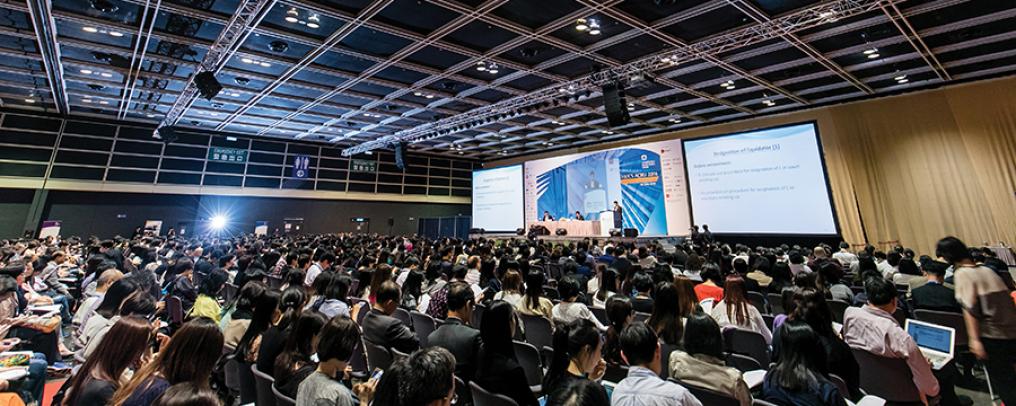CSj takes a look at a new initiative launched by the Hong Kong Institute of Chartered Secretaries (HKICS) to promote anti-money laundering and counter-financing of terrorism (AML/CFT) in the corporate service provider(s) sector in Hong Kong.
In 2008 the HKICS issued guidelines that explained the different stages of money laundering and noted that corporate service providers (CSPs) need to do their part in the AML/CFT fight. The services they provide, such as company formation, provision of directors and registered office, and other corporate-related services, put them at money laundering and terrorist financing (ML/FT) risks. The role of the HKICS was to point to these risks and develop best practices, including a checklist for HKICS members. This put HKICS members ahead of the curve in the AML/CFT fight.
In 2012, aside from general laws and regulations relating to the AML/CFT fight, a specific law for financial institutions, including banks, was enacted. This was the Anti-Money Laundering and Counter-Terrorist Financing (Financial Institutions) Ordinance (AMLO). While it is specific to financial institutions, there is currently, four years on, talk to expand the coverage of the AMLO to CSPs as part of the designated non-financial businesses and professions (DNFBP) sector.
Such an expansion would be in accordance with the standards set by the Financial Action Task Force (FATF) – the source of the laws and regulations relating to the international AML/CFT fight. Hong Kong is an active member of FATF and therefore subject to FATF Recommendation 22 requiring jurisdictions to regulate CSPs as part of the DNFBP sector.
If we backtrack a moment, during the rewrite of the Companies Ordinance, the HKICS put forward the idea that Hong Kong should regulate CSPs. The HKICS saw this as relevant to financial institutions in their AML/CFT fight. This is because CSPs are often the first line of defence for financial institutions in the AML/CFT fight. Certainly, it is CSPs business to know their clients, and this knowledge is often more intimate than that of financial institutions, like banks, where the relationship is on a more ad hoc or transactional basis.
Hong Kong passed on the opportunity to regulate this area when the new Companies Ordinance was enacted in 2012. In all fairness, the timing was probably not right, as centre stage at the time was the regulation of financial institutions which must come first. However, CSP regulation needed to be revisited. For example, as recently as May 2016, Singapore passed regulations to regulate CSPs. Hong Kong can and should consider having similar regulations. The HKICS remains committed to do its part should there eventually be regulation for 'registered agents’ in Hong Kong. The current situation where any unqualified person over 18 may designate themselves as a 'registered agent’ is untenable. The necessary regulations could be added to the Companies Ordinance or the AMLO.
Paul Moyes FCIS FCS, HKICS Council Member and Professional Services Panel Chair, believes that legislation equivalent to that in Singapore will be brought in in Hong Kong. 'At the moment anyone can set themselves up as a CSP in Hong Kong and we have heard of some appalling practices in the market. I expect a licensing requirement to be brought in to ensure that intermediaries are licensed and accountable for their activities,’ he says.
Pending regulation of 'registered agents’, a more imminent problem for Hong Kong is that financial institutions, especially banks, are becoming increasingly, and rightfully, worried about AML/CFT regulations. In accordance with FATF and AMLO requirements, financial institutions need to conduct due diligence as part of 'know your client’ (KYC) requirements, along with other matters like record keeping, continuous monitoring and training for senior management and staff. In view of the resources that are required to be committed on these topics, banks are becoming selective as to who they do business with. Revenue has to justify the resources they need to put in when establishing new, or maintaining existing, client relationships.
The issue is compounded by the increasingly complex global environment out of which banks operate. This means that the fallout of not getting AML/CFT concerns right results not only in business loss, but could lead to much larger global fines and unquantifiable reputational damages. Banks are thus increasingly nervous and resorting to wholesale de-risking of their client relationships by not establishing new relationships or terminating existing ones, at least in perceived AML/CFT risk areas. When the butterfly effect is multiplied, the ease of doing business is affected. This is happening in Hong Kong, especially where the ability to open a bank account is not regarded as a basic right as with certain other jurisdictions.
It is in this context that the HKICS seeks to help. FATF Recommendation 17 states that '[c]ountries [which includes Hong Kong] may permit financial institutions to rely on third parties to perform elements [of] the [customer due diligence] CDD … to introduce business…’. As to the first part of FATF Recommendation 17, that is the use of intermediaries for customer due diligence, under Part 2, Division 2, Section 18 of AMLO, it is expressly stated that '… a financial institution may carry out customer due diligence measure by means of an intermediary specified…’ which includes HKICS members. The pre-conditions are that the intermediary consents in writing to be the financial institution's intermediary, and that the information would be delivered up where requested by the financial institution to do so. This means the financial institutions, including banks, should consider using HKICS members for their customer due diligence. They are well justified to do so as CSPs, as discussed, have more intimate knowledge of their clients on a continuing basis and the AMLO provides the necessary statutory backing.
As to the second part of FATF Recommendation 17, in fact financial institutions can take business referrals from CSPs. The pre-condition, is that the CSPs should have processes in place for customer due diligence and other matters approximating those of the financial institutions, including banks.

The HKICS Guideline and Charter
The new HKICS initiative has two aspects.
1. The AML/CFT Guideline
The HKICS AML/CFT Guideline, which is freely available on the HKICS website: www.hkics.org.hk, provides practical recommendations on areas such as customer due diligence, record-keeping requirements, and management and staff training. Paul Moyes points out that AML/CFT compliance can be quite a complex area of practice and it isn’t always entirely clear what best practice is. 'We have drafted the Guideline in a way that makes it easy to use and it makes explicit what best practice is,’ he says.
The HKICS hopes that the Guideline will be used as widely as possible. 'The Guideline is open to all CSPs, irrespective of whether they are our members,’ points out Ivan Tam FCIS FCS, HKICS President. 'This is our gift to the profession,’ adds Mr Moyes, 'it is there on the HKICS website for anyone to download.’
2. The AML/CFT Charter
The HKICS AML/CFT Charter is the first AML/CFT self-regulatory initiative in Hong Kong. The Charter requires subscribing organisations to demonstrate that they meet the Charter's standards on AML/CFT – as set out in the HKICS AML/CFT Guideline – and those standards are equivalent to those imposed on financial institutions. The Guideline is based on the SFC AML/CFT Guideline applicable to financial institutions, including banks. Thus, any CSPs that adopt the Guideline should be within the scope of FATF 17 because they follow the rules for
financial institutions.
Paul Moyes explains that any organisation that wants to subscribe to the Charter will need to employ, as a member of its senior management, a 'fit and proper’ person as a named Responsible Person who bears ultimate responsibility for ensuring compliance with the Charter. He adds that the Responsible Person does not need to be a member of the HKICS. 'We define 'fit and proper’ as it is defined in the Companies Ordinance. That is, the Responsible Person has to be a member of the HKICS, the Law Society, the Hong Kong Institute of Certified Public Accountants (HKICPA) or equivalent body,’ he says.
Organisations found to be involved in a material breach of the Charter or its related obligations will be removed from the list of HKICS AML/CTF Organisations. The HKICS is also permitted to share any adverse findings, and the basis therefore, with regulators and/or other professional bodies for which the Responsible Person may be subject to discipline.
Subscribers will, upon acceptance, be certified to use the HKICS AML/CFT Logo and be listed on the HKICS website as an accredited HKICS AML/CFT Organisation. Moreover, they and their 'fit and proper’ responsible person, who are subject to HKICS discipline, would be placed on a public list on HKICS's website at www.hkics.org.hk, for public search purposes. The assurance required for accreditation involves identification of the CSP's AML/CFT risks and an audit of the test of controls in the context of the HKICS AML/CFT Guideline.
What impact will this initiative have?
It is hoped that this initiative will put Hong Kong ahead of the curve again in the AML/CFT fight. For accredited HKICS AML/CFT Organisations it will be a source of reliance on customer due diligence issues and for business referrals. As mentioned above, the initiative also aims to improve the ease of doing business in Hong Kong.
Six Hong Kong and international CSPs have signed up for the Charter, namely:
- Ernst & Young Company Secretarial Services Ltd
- McCabe Secretarial Services Ltd
- Reanda EFA Secretarial Ltd
- SW Corporate Services Group Ltd
- Tricor Services Ltd, and
- Vistra Corporate Services (HK) Ltd.
The Charter also has the support of the HKSAR government. The press launch of the Charter was attended by Salina Yan JP, Deputy Secretary for Financial Services and the Treasury (Financial Services). 'The HKICS is grateful for the HKSAR Government's support and is pleased that so many leading Hong Kong and international CSPs have publicly demonstrated their commitment in the fight against money laundering, terrorist financing and illegal tax evasion by adopting the HKICS standards which converge with those of financial institutions,’ Ivan Tam commented at
the press conference.
Mohan Datwani
HKICS Senior Director and Head of Technical & Research
Kieran Colvert
Editor, CSj
The press conference and AML/CFT Charter signing ceremony took place on 17 May at the HKUST Business School Central.
More information is available on the AML/CFT Charter section of the HKICS website: www.hkics.org.hk. For enquires to join HKICS's AML/CFT Charter, please contact Mohan Datwani via the HKICS website.
The HKICS has set up an AML/CFT Charter Advisory Board to advise on standard setting and disciplinary related matters. The Advisory Board comprises: Edith Shih, former HKICS President and Senior Vice-President of the UK Institute of Chartered Secretaries and Administrators (ICSA); Anthony Rogers, former Vice-President of the Court of Appeal; and Dr PM Kam, former Chief Executive Officer of the Financial Reporting Council.



